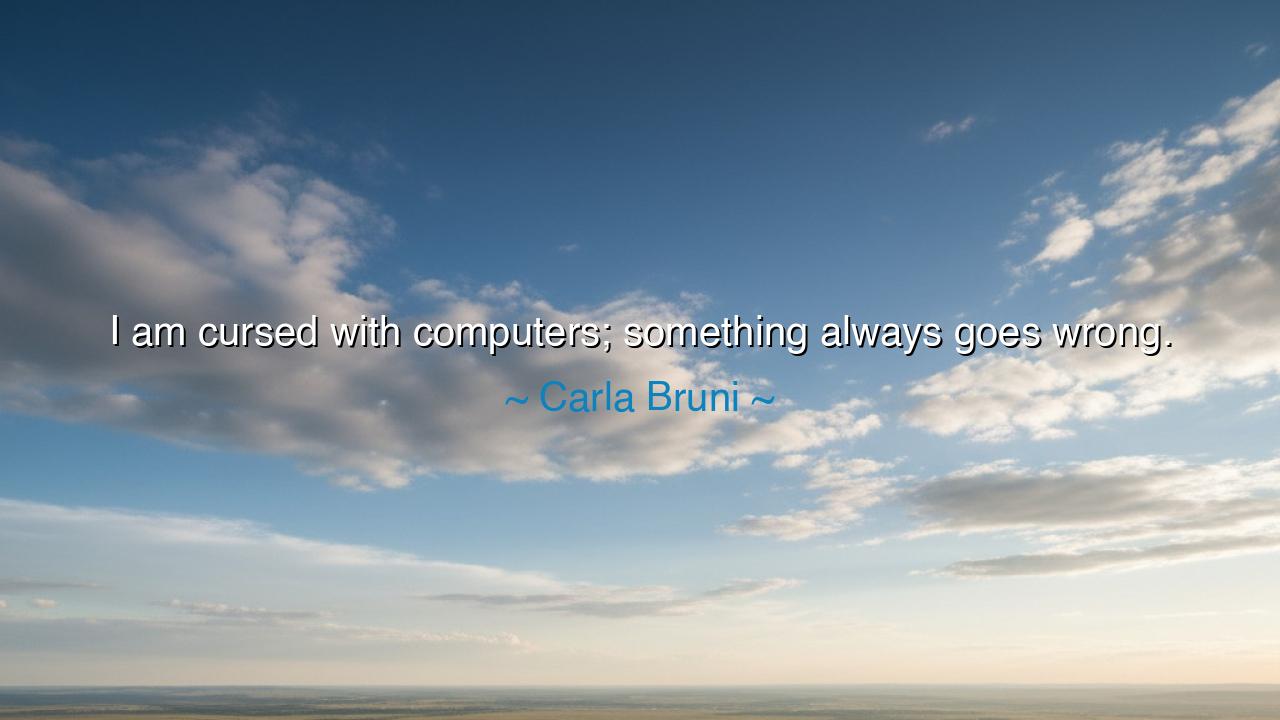
I am cursed with computers; something always goes wrong.






In the words of Carla Bruni, “I am cursed with computers; something always goes wrong.” This statement, wrapped in humor and frustration, speaks to the deep and sometimes ironic relationship we have with the tools that were designed to make our lives easier. Computers, those marvels of modern invention, promise to simplify our world, yet they often bring frustration, confusion, and an unexpected sense of powerlessness. Bruni’s words capture the eternal human dilemma of our reliance on machines—tools that, for all their brilliance, are often beyond our complete control.
In the ancient world, the great thinkers pondered the role of tools in human life. The Greeks and Romans, though without the wonders of modern technology, understood the tension between innovation and control. Plato often questioned how humanity could balance the use of artificial creations with the need to maintain mastery over them. The ancient Greek philosopher Aristotle recognized that the use of tools, whether in agriculture, war, or art, could enhance human life, but only if those tools were used wisely. Like the computers of today, tools are double-edged: they can elevate, but they can also trap us in their intricacies if we do not understand them fully.
Consider the story of Daedalus, the famed Greek inventor, whose creations, though magnificent, often brought him sorrow. Daedalus crafted mechanical wings for himself and his son, Icarus, a feat of incredible genius. Yet, despite his brilliance, these wings led to tragedy when Icarus, overconfident in his father’s creation, flew too close to the sun, causing the wax to melt. Daedalus’ creation, meant to liberate, became the instrument of his son’s doom. This myth speaks to a deeper truth: as we build machines, we must also respect their power and the potential for them to unravel what we have created. Bruni’s curse is a reflection of this age-old struggle between humanity’s desire for progress and the unpredictability of the tools that help us.
The Romans, too, faced their own technological marvels, from aqueducts to war machines, and they too experienced the frustrations of relying on things beyond their control. The siege engines of Roman warfare, while incredibly effective, could easily malfunction or be turned against the very soldiers who relied on them. Like Bruni, the Romans found that even their greatest innovations were not always reliable. The great philosopher Seneca, who lived through the power and complexity of Roman engineering, often warned against relying too heavily on external tools, urging instead for inner strength and resilience. He would have understood Bruni’s frustrations, recognizing that technology—though essential—can never be the sole source of our power.
In the modern world, we experience the same paradox, particularly with computers. These machines, which are meant to enhance our productivity, creativity, and connection, can instead create a cycle of dependence and disappointment. As Bruni articulates, there is something inherently frustrating about machines that fail, not because of a lack of effort on our part, but because they possess a complexity that is often beyond our grasp. It is as though, in our pursuit of convenience and efficiency, we have traded the certainty of simpler tools for the chaos of intricate systems that seem to operate beyond our control.
The lesson in Bruni’s words is one of humility and patience. Just as Socrates reminded his students that knowledge of the world was tempered by the understanding of our own limitations, we must acknowledge that the tools we create—be they computers or any other invention—are never infallible. The very act of creating something to serve us must be tempered by an understanding that we, too, are subject to the flaws of the systems we build. Instead of becoming frustrated or feeling cursed by these setbacks, we must learn to respond with resilience and adaptability.
In your own life, take this lesson to heart. When faced with the frustrations of modern tools and technologies, remember that the problem is not necessarily with the tool itself, but with our relationship to it. Approach your technology not with a sense of entitlement or dependence, but with a spirit of respect and understanding. Learn the limits of what you can control, and recognize that not everything will go according to plan. Like the ancients who found their strength in the balance between invention and wisdom, you too can find peace by understanding the complexities of the tools you use and learning to navigate them with patience and grace.






AAdministratorAdministrator
Welcome, honored guests. Please leave a comment, we will respond soon